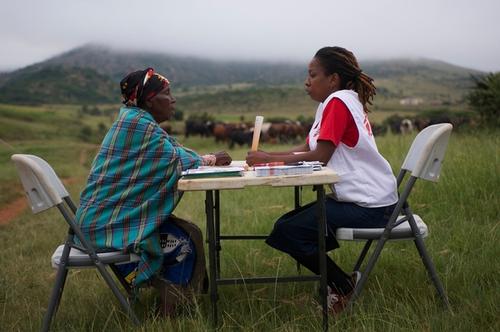Stopping the spread of HIV/AIDS from mothers to their children is an essential step in curbing the disease’s epidemic in Swaziland.
Since February 2013, an innovative approach, commonly referred to as PMTCT B+ (prevention of mother-to-child transmission, option B+), is being rolled out by Médecins Sans Frontières (MSF) and the Ministry of Health in the Nhlangano area, in the south of the country. It aims to place 2,000 HIV-positive pregnant women on treatment over the next four years, as soon as possible after their diagnosis. So far, more than 200 women have joined the programme.
“In Swaziland, the prevalence of HIV/AIDS among pregnant women, which currently is close to 40 per cent, is extremely worrying. Without treatment, 25 to 40 per cent of the children born to HIV-positive mothers will also be infected,” explains Dr Serge Kabore, MSF’s medical coordinator in Swaziland. “The aim of this new PMTCT B+ approach is to place all pregnant and breastfeeding women who have the virus on lifelong antiretroviral treatment, whatever their CD4 count. That will prevent mother-to-child HIV/AIDS transmission, while also keeping the mothers in good health, protecting any future babies they may have and protecting HIV-negative partners.”
More patients receive treatment
In other approaches to fighting AIDS, a patient’s CD4 count determines whether he or she should be put on antiretroviral (ARV) treatment. After years of advocacy by different health actors, including MSF, the World Health Organization has just raised the CD4 threshold from 350 to 500. This important move means that a greater proportion of patients will now be able to receive treatment more quickly, protecting them against opportunistic diseases and thus limiting the possibility of transmission with other people.
In 2013, it is unacceptable that mother-to-child HIV/AIDS transmission is still a reality.Elias Pavlopoulos, MSF’s head of mission in Swaziland
In 2013, it is unacceptable that mother-to-child HIV/AIDS transmission is still a reality,” stresses Elias Pavlopoulos, MSF’s head of mission in Swaziland. “By implementing the PMTCT B+ approach, we want to show that it’s possible in Swaziland to completely avoid transmission of the virus from the mother to the child, and to keep the mothers in good health too.
Catalyst for change
Today, MSF is launching a website, Swaziland: Born HIV-free, which explains the PMTCT B+ approach, its advantages and the objectives of this pilot project. “The results will be regularly evaluated by MSF and the Ministry of Health according to three criteria: impact in terms of health and transmission rates, the experience of patients and health personnel, and financial aspects. We hope to influence the national health policy so that this new approach is implemented throughout the country. MSF is acting as a catalyst for change,” adds Pavlopoulos.
This new PMTCT B+ approach is an important development in the fight against the HIV/AIDS epidemic in Swaziland. The long-term objective is to invert the curve of the epidemic by making this approach the norm for the general population. PMTCT B+ is a first step towards achieving a generation without HIV/AIDS in the Shishelweni region.





